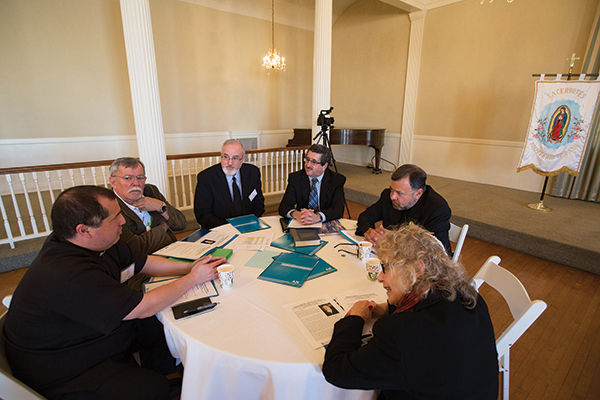Dozens of local Latino Catholic priests and Jewish rabbis seeking to strengthen interfaith relations — and discuss their shared migrant experiences — came together March 10 for a day of fellowship and conversation at Wilshire Boulevard Temple in Los Angeles.
“Exploring Bonds, Celebrating Traditions: A Day of Learning and Dialogue for Rabbis and Latino Priests,” presented by the American Jewish Committee (AJC) Los Angeles in partnership with the Archdiocese of Los Angeles, brought together reform, conservative and orthodox rabbis and Latino priests for roundtable discussions between the clergy members about faith issues, socio-political positions, and much more.
Rabbi Marc D. Angel, founder and director of the Institute for Jewish Ideas and Ideals, offered the keynote address, followed by responses from Auxiliary Bishop Alexander Salazar and Rabbi Mark Diamond, regional director of AJC Los Angeles, which led to robust roundtable talks.
Angel spoke at length about his experience growing up in Seattle as a Sephardic Jew, a Jewish tradition with roots in Spain, from where they were expelled more than 400 years ago. Despite expulsion, the faith tradition thrived in Turkey and elsewhere, with Sephardic Jews maintaining Hispanic traditions and speaking a medieval Spanish known as Judeo-Spanish or “Ladino.”
“Growing up in a Hispanic Jewish community in Seattle was a double blessing and a double whammy,” he said, noting that there was always “an identity crisis” — an experience not unlike those faced daily by Latino immigrants in the U.S.
“When we grow up as part of a minority group, whether it’s Jewish or Sephardic Jewish or Hispanic, how do we maintain our traditions, the integrity of who we are, while at the same time learning to adapt and be open to change and progress?” he asked.
The ongoing challenge to find this delicate balance “connects us as minority groups,” explained Angel. Interfaith gatherings such as today’s can serve as a starting point for identifying such bonds and similarities, he continued, and also for learning about our differences and eliminating possible prejudices and stereotypes.
Father Arturo Corral, pastor of St. Thomas the Apostle Church, Los Angeles, described the roundtables as a positive “first step” toward understanding differences in order to work together more productively and positively impact important societal issues, such as immigration and workers’ rights.
One of the topics addressed at Father Corral’s table (by three Jewish rabbis and three Latino Catholic priests) involved sharing memories about their initial introductions to each other’s faith traditions (e.g., a television documentary about the Holocaust). That led to a discussion about similarities, both cultural (how both groups have faced prejudice/discrimination) and religious (“Jesus was Jewish”).
Father Corral found the interfaith gathering to be a “very positive experience,” and was encouraged to see leaders from both religions in attendance, including Bishop Salazar, who participated alongside fellow priests and rabbis during the roundtable discussions.
“He was with us, showing us the importance of strengthening and embracing our relationship with the Jewish community,” Father Corral said. “That meant a lot to me.”
During his address, Bishop Salazar discussed the importance of the Second Vatican Council’s Nostra Aetate, the groundbreaking 1965 declaration that called for Catholics and Jews to engage in friendly dialogue and biblical and theological discussions, and also calls for the Church to dialogue with other world religions.
“This is a real challenge to all of us, to move more closely together,” said Bishop Salazar. “Today [we called] Latinos and Jews together in this great part of the world, to have Catholic priests and Jewish rabbis come together to see how we can work more effectively with one another, understanding one another’s traditions, and then move forward to see how we can better minister to our people.”
For Rabbi Jonathan Jaffe Bernhard, senior rabbi at Arat Ari El in Valley Village and president of the Board of Rabbis of Southern California, the interfaith event offered the opportunity to step away from his day-to-day life and “broaden” his perspective. “I’m aware of the insularity of my life, even as a rabbi in a very open and inclusive kind of community.”
He found it very fulfilling “to be able to have a conversation with this group and to hear their different responses, even if the responses aren’t directly related to something Rabbi Angel was saying, but just as a touch-point for different kinds of ideas — that’s worth the ticket.”

